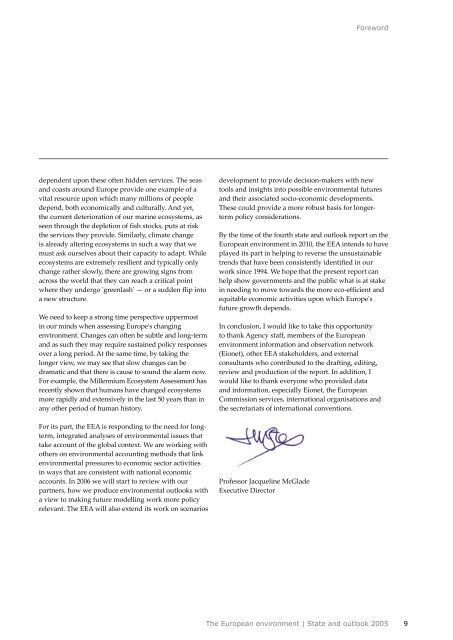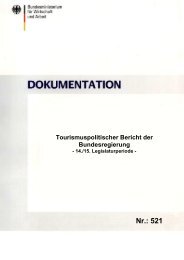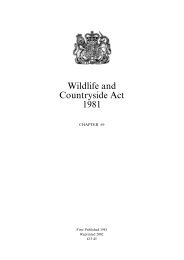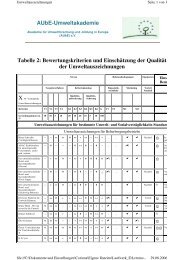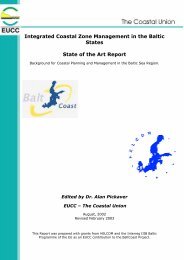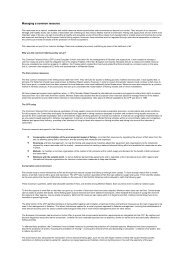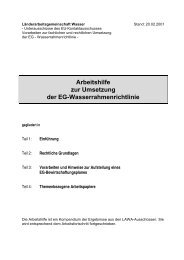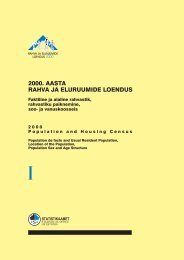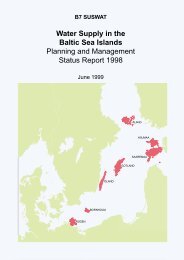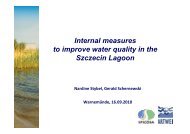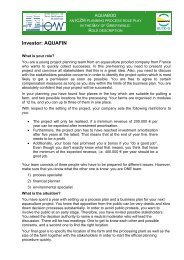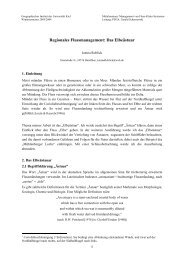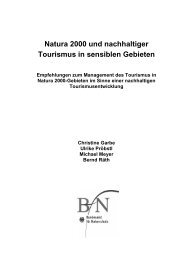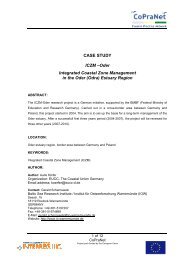The European environment - State and outlook ... - IKZM-D Lernen
The European environment - State and outlook ... - IKZM-D Lernen
The European environment - State and outlook ... - IKZM-D Lernen
You also want an ePaper? Increase the reach of your titles
YUMPU automatically turns print PDFs into web optimized ePapers that Google loves.
Foreword<br />
dependent upon these often hidden services. <strong>The</strong> seas<br />
<strong>and</strong> coasts around Europe provide one example of a<br />
vital resource upon which many millions of people<br />
depend, both economically <strong>and</strong> culturally. And yet,<br />
the current deterioration of our marine ecosystems, as<br />
seen through the depletion of fish stocks, puts at risk<br />
the services they provide. Similarly, climate change<br />
is already altering ecosystems in such a way that we<br />
must ask ourselves about their capacity to adapt. While<br />
ecosystems are extremely resilient <strong>and</strong> typically only<br />
change rather slowly, there are growing signs from<br />
across the world that they can reach a critical point<br />
where they undergo 'greenlash' — or a sudden flip into<br />
a new structure.<br />
We need to keep a strong time perspective uppermost<br />
in our minds when assessing Europe's changing<br />
<strong>environment</strong>. Changes can often be subtle <strong>and</strong> long-term<br />
<strong>and</strong> as such they may require sustained policy responses<br />
over a long period. At the same time, by taking the<br />
longer view, we may see that slow changes can be<br />
dramatic <strong>and</strong> that there is cause to sound the alarm now.<br />
For example, the Millennium Ecosystem Assessment has<br />
recently shown that humans have changed ecosystems<br />
more rapidly <strong>and</strong> extensively in the last 50 years than in<br />
any other period of human history.<br />
For its part, the EEA is responding to the need for longterm,<br />
integrated analyses of <strong>environment</strong>al issues that<br />
take account of the global context. We are working with<br />
others on <strong>environment</strong>al accounting methods that link<br />
<strong>environment</strong>al pressures to economic sector activities<br />
in ways that are consistent with national economic<br />
accounts. In 2006 we will start to review with our<br />
partners, how we produce <strong>environment</strong>al <strong>outlook</strong>s with<br />
a view to making future modelling work more policy<br />
relevant. <strong>The</strong> EEA will also extend its work on scenarios<br />
development to provide decision-makers with new<br />
tools <strong>and</strong> insights into possible <strong>environment</strong>al futures<br />
<strong>and</strong> their associated socio-economic developments.<br />
<strong>The</strong>se could provide a more robust basis for longerterm<br />
policy considerations.<br />
By the time of the fourth state <strong>and</strong> <strong>outlook</strong> report on the<br />
<strong>European</strong> <strong>environment</strong> in 2010, the EEA intends to have<br />
played its part in helping to reverse the unsustainable<br />
trends that have been consistently identified in our<br />
work since 1994. We hope that the present report can<br />
help show governments <strong>and</strong> the public what is at stake<br />
in needing to move towards the more eco-efficient <strong>and</strong><br />
equitable economic activities upon which Europe's<br />
future growth depends.<br />
In conclusion, I would like to take this opportunity<br />
to thank Agency staff, members of the <strong>European</strong><br />
<strong>environment</strong> information <strong>and</strong> observation network<br />
(Eionet), other EEA stakeholders, <strong>and</strong> external<br />
consultants who contributed to the drafting, editing,<br />
review <strong>and</strong> production of the report. In addition, I<br />
would like to thank everyone who provided data<br />
<strong>and</strong> information, especially Eionet, the <strong>European</strong><br />
Commission services, international organisations <strong>and</strong><br />
the secretariats of international conventions.<br />
Professor Jacqueline McGlade<br />
Executive Director<br />
<strong>The</strong> <strong>European</strong> <strong>environment</strong> | <strong>State</strong> <strong>and</strong> <strong>outlook</strong> 2005<br />
9


